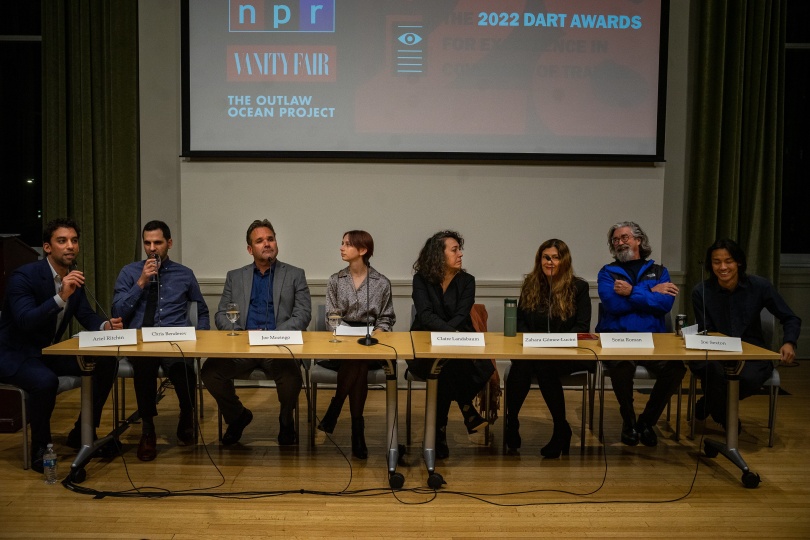2022 Dart Awards: Reporting Tips from our Honorees
On December 1st, the 2022 Dart Awards honorees participated in a roundtable discussion about their craft, and approach to reporting complex stories.

From L to R: Ariel Ritchin, Chris Benderev, Joe Mozingo, Claire Landsbaum, Zahara Gómez Lucini, Sonia Roman (interpreter), Joe Sexton and Ed Ou.
Panelists included:
Zahara Gómez Lucini, the photographer and videographer for The Atavist’s "A Feast for Lost Souls", which tells the story of a woman-led collective searching for the remains of their loved ones — The Disappeared of Mexico — and how these survivors live with grief and loss through incredible action.
Joe Mozingo, the reporter for the Los Angeles Times’s series "Disease, Inequity and Resilience in South L.A." Portraying the ravages of the pandemic in South Los Angeles, a hotspot of COVID-19 deaths during the Delta surge, the judging panel commended the reporting team for shining a light on “compounding tragedies and unfairnesses,” and putting together a “riveting package” of “love and loss in the face of adversity.”
Chris Benderev, the host, reporter and producer for NPR’s Embedded podcast, whose first episode "A Damn Paper” documents the human stories behind the 2018 shooting at the Capital Gazette newsroom in Annapolis, Maryland. Judges called it “a masterpiece of trauma-informed journalism” that “cuts right to the heart.”
Ed Ou and Joe Sexton, cinematographer and editor respectively for the Outlaw Ocean Project’s "The Secretive Prisons that Keep Migrants Out of Europe," an investigation and multimedia project that examines the European Union's shadow immigration system that captures migrants arriving from Africa, and sends them to brutal detention centers run by militias in Libya.
Claire Landsbaum, senior editor for Vanity Fair’s "They Were Sons," in which 15 surviving mothers tell stories of their sons who were killed at the hands of police.
Below are insights and reporting advice from the conversations, edited for brevity and clarity.
Show up
When starting work on a complex story, be prepared to display commitment. If sources appear nervous or reluctant to grant interviews - and you believe in the public interest of the story - then be patient and don’t underestimate the power of showing up, of being present. Take things slowly and build trust. Have off-the-record conversations and meet people for coffee. Sometimes they need to get to know you so that they can understand why you want to tell their story and - crucially - how you will tell it.
Respect people’s right to say no
Show up and make the effort to build trust and relationships - but equally respect when sources say no. Traditionally, journalists are trained to try and get the impossible story. It’s a badge of honor to change people's minds, and persuade them to talk when they appear unwilling. However, it can be just as challenging to recognize when to stop pushing, and respect someone's inviolable right not to tell their story. Your career will survive the loss of an interview. But the cost of pushing someone too far can be high. Instead, take time to think deeply about why someone doesn’t want to talk to you - this can provide useful context and insight for a piece.
Think about what you need - and what you don’t
Journalists should try and portray the life and personality of their sources beyond any traumas they have experienced. This kind of deep, sensitive reporting requires time and preparation, and thinking about the kinds of questions you’d like to ask. As you prepare, consider what material you would like, but take the time to think about what you don’t need. Avoid taking up people’s time, or asking them tough questions, just for the sake of it.
Consider the relationship between trauma and hope
Traumatic events can be horrifying, but they’re often linked to hope. When you’re reporting on people who have lived through trauma, focus on factors such as their growth, resilience and hopes too. This balance will demonstrate respect for your sources by presenting them with complexity and dignity.
Is there a new way to tell the story?
Sometimes, if journalists are reporting on well-covered areas or topics, they might sense fatigue in their audiences - and their sources. On those occasions, think about novel ways to approach the piece: can you use new technologies, formats, interview techniques or mediums to eschew convention and cliche, and tell the story in a new way?
Managing expectations
When working with traumatized sources, try to set out expectations before an interview. Gain informed consent, and be clear that your source's story might never be published. It can be difficult when this happens, but don’t always assume someone will feel betrayed. For some people, the very act of someone listening to and validating their story holds value.
Look after yourself
There is a tendency among journalists to feel guilty if they are impacted by their work: sometimes they feel that their problems and feelings aren’t legitimate when compared to the struggles faced by their sources. However, many find it helpful to talk to colleagues, friends, family or a therapist. Whatever your support network looks like, it’s important to find time and space to take care of yourself.
You can find links to all the honored work here.






































































































